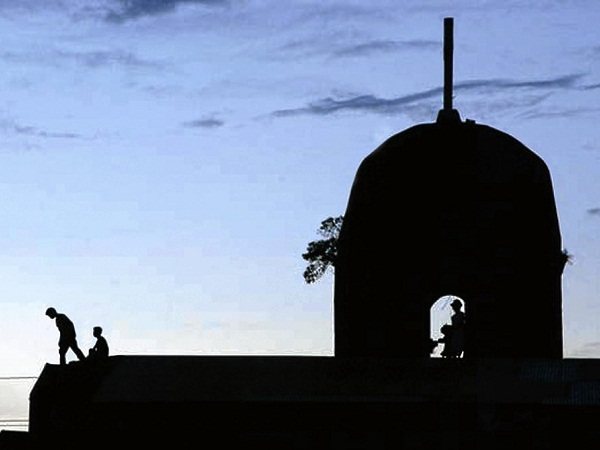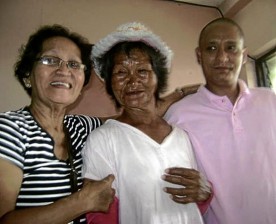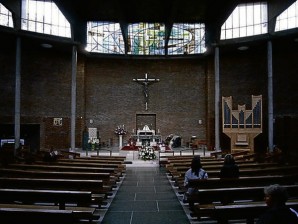Long-lost London-born son reunites with mom

SILHOUETTE of Esperanza Tresvalles in the bell tower of the Virac cathedral where she lived for years. Photo by Fernan Gianan
Almost three decades of separation ended when a London-born son reunited with his Filipino mother four months ago. The son, now 35 years old, decided to finally be with his mother after he slew the demons that had bedeviled him for years.
On the way to the meeting place in Virac, Catanduanes, he did not know how to comport himself. “I did not know how I would react. I didn’t know how to be a son; I have never been one for nearly 30 years,” said Tarik.
Article continues after this advertisementWhen he finally saw his mother, he was overcome with pity. “Mom has grown old. I really wanted to cry the first time I saw her. I had to hold it back because there were many people around us. But when I hugged her, I no longer was able to control my tears,” he said.
In between sobs, he whispered to his mother, “I’m here to take care of you mom.”
It took a little while before Esperanza Tresvalles could figure out that the man before her was her son she had not seen for 29 years. Tarik said it was because of her mental image of him as a boy.
Article continues after this advertisement
‘My little boy’
Surprised, Esperanza replied repeatedly: “My little boy, my little boy!”
After a while, she held the face of her son and said “you look exactly like your father.”
The meeting ended the separation that was marked by twists and turns in the lives of Tarik and Esperanza.
In the early ’70s, a hard-working Esperanza from Bato, Catanduanes, left her hometown and worked as household help of some famous families in Forbes Park.
Later, she went to London and worked for about seven years with good families, allowing her to learn and speak the King’s language.
While in London, she sent money home for a retirement house she had in mind. Meanwhile, she had a relationship with a British-Pakistani lover, had a son by him, but the affair didn’t last.
Love child
After her love child was born, she went back to Catanduanes in the early ’80s only to discover she had no house to speak of. A half-brother made off with the money for building her dream house.
Not only was her dream house gone (nonexistent actually) but the reality of love lost in London, the discovery of family betrayal back home and a modest savings soon gone aggravated her condition.
Unable to cope with her situation, Esperanza lost control of her mental faculties and soon had a swift descent into madness, much like the unforgettable character Sisa in Rizal’s “Noli Me Tangere.”
Soon, she was roaming the streets of Bato and Virac towns with her London-born son Tarik Kahn, then 4 years old (Yes, he carried his father’s name).
Adoption, accident
Unable to bear the sight of a 4-year-old boy roaming the streets with his mother gone mad, a neighbor—William Urbano—took pity on the son and “adopted” him.
Urbano, a couturier, brought the child with him to Albay where he started his primary schooling in Divine Word College in Legazpi City.
This was the last time the poor mother saw her son, Tarik.
A tragedy would soon befall the son. On his way home from school, Tarik, then about 7 years old, was hit by a Manila-bound bus and was brought to the National Orthopedic Hospital in Quezon City where he was confined for over a year.
When he got well, the hospital didn’t turn over Tarik to Urbano because the latter had no adoption papers. The boy lived with one concerned family after another. When things didn’t work out with his foster families, he moved from one orphanage to another.
He got wind of his mother’s fate from a story that came out in a national daily in the mid-’90s.
Fr. Ben Villote
The young Tarik had periods of restlessness, became rebellious and unmanageable but soon found rays of hope in the migrant center managed by Fr. Ben Villote in Pasay City. His plight caught the attention of the Protacio family in Parañaque. He got assistance, including regular advice on what to do with his life.
Once he found his bearings, Tarik went back to school, finished college in Legazpi City, got Internet-related work and soon settled down with a girl he met in school. The son’s coming to terms with himself was featured in the Sunday Inquirer Magazine.
Belfries
In April, Tarik decided it was time to see his mother, who had been roaming the streets of Virac and Bato since 1984.
She lived in belfries and town squares, and found short-term menial jobs in parish convents in exchange for food and accommodation.
Coming to terms
“I realized that mom’s got no one else in the world but me. The worst thing I can do is to show up when she is dead or when I’m no longer needed. That would just be really sad. Also, I needed to know my true past to fully understand who I am now.”
A month before Mother’s Day, Tarik was sure he had come to terms with his past and was ready to be reunited with his mother—whatever her condition was.
He sought the help of some friends on the island—Sonia and Efren Sorra—to arrange the meeting. Flor Balota, manager of the local Philippine Ports Authority (PPA), offered the office lounging room for their meeting.
On April 18, Tarik took a flight from Manila to Virac and went straight to the PPA office. The meeting had its awkward moments.
A friend on the island, Theresa Herrmann, offered mother and son the use of one of her houses, surrounded by gardens, so they could bond in privacy.
In the garden house, his mother was still feeling her way around. She would only talk to him when he asked her questions.
Said Tarik: “But slowly she felt relaxed and started to tell stories of me as a little boy in London. For several days, she was still doing the things she’s gotten used to in the streets, her home for more than 30 years. She would wear her clothes wet from the laundry and let it dry on her body.
She was used to that life. I had to constantly remind her that she now has a home and she no longer needs to do those things. She tells my wife that I will leave again someday.”
Being reunited with a mother he had not seen for almost three decades wasn’t easy for Tarik.
Bipolar
He brought her to a doctor and his mother was diagnosed as bipolar.
Said Tarik: “When mom first started taking her medication, I was quite happy with the results. She stopped talking to herself and she would do everything (as in everything) we tell her to do. But later on, I realized that she was behaving more like a ‘zombie’ than a human. She would sit down staring blankly at the wall and drool without her noticing it. This went on for days.
“Then one day, out of the blue, she screamed, ‘What you are giving me is poison!’ She was in tears. That night I talked to my wife. ‘Am I doing the right thing?’ I told her.
Love, not medicine
“I miss mom; I miss her old happy self. I would rather have a ‘crazy’ mom than a zombie mom. My wife told me that maybe what mom needs are not medicines but genuine love from a son. It was then that I decided to discontinue mom’s medicines. Within a day or two she was back to her old happy self. Only this time, she was more normal,” he said.
Tarik acknowledges the difficult adjustment period.
Childlike
Tarik confides: “It’s not easy being a son to mom. The difficulties were aplenty initially and they pop up on a daily basis. Mom basically is childlike in all sense of the word. I constantly tell her that if she needs anything, all she has to do is ask. Sometimes she would arrive with a ripe papaya (or any other fruit) in hand. For me, she says. When asked from whom she requested permission to pick the fruit, she would answer, ‘Everything was made by God so I asked permission from God and the tree.’”
“But someone else planted that Mama,” he said. “You should have asked permission.”
The son continued: “Sometimes, she would go to the market alone and return with two bagsful of goodies. ‘But where did you get the money to buy that Mama?’ I asked. ‘People gave them to me,’ she tells me. I have to explain that she no longer has to ask people for doles because she now has a son to take care of her. ‘But I have to take care of you, too,’ she would say. So I started giving mom her own pocket money. But every time she goes to the market, she buys things not for herself but for me.”
For the moment, the son’s immediate concern is for his mom to recover her old documents. “I want to bring mom back to London someday, even just for a vacation. She constantly tells me stories of our stay in London, you see. Whenever she sees images of Europe, it would trigger a flow of London memories. I already contacted the embassy. But right now, all I have is mom’s baptismal certificate and nothing else.”
Story of hope
It took some time to reassure Esperanza that her son Tarik was back for good.
Said Tarik: “Mom’s story is a story of hope. I am thankful to the many people who have been part of our lives, for without them our story would not have been possible. I am thankful, too, to the good people of Virac who took care of mom while I was away.
Full circle
“When I took the flight to Virac, I had to uproot myself, leave good friends behind, leave material possessions and gave up whatever financial investments I had then. I had to start from scratch. But it was well worth it.
“I’ve now come full circle by being with my mom. Our mothers have given so much for us, and we do so little for them. Get to know your parents while you still can. You never know when they’ll be gone,” Tarik said.
Also read From London to Virac: A Mother’s Tale of Woe
(Pablo A. Tariman has covered the performing arts in the past
33 years and organizes concerts on the side. He was born in Baras, Catanduanes, and has three grandchildren.)



















